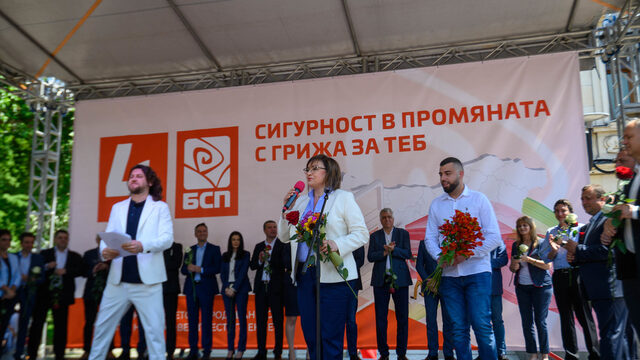No real political campaigning from the parties, anti-status quo forces relying on the caretaker government to wage war against GERB, fortification around the core electorates for all, and absence of debate in the media. This is the situation in Bulgaria three days before the early Parliamentary elections on 11 July, the second national vote this year.
The outcome is just as uncertain as in April, but one thing seems clearer this time - GERB is out of contention to govern. So the ball will pass straight to the so-called protest or anti-status quo parties that will make it into the next parliament. The big unknown is the precise redistribution of votes and seats after Sunday and, respectively, how likely it is that There is such a people (TISP), Democratic Bulgaria and Stand up! Thugs - out! (SUTO) could resolve their differences and form a working coalition.
Beyond that lies the even more existential question - would such a coalition be a viable alternative to the model established by GERB, and one backed by most other parties over the past decade? Or would it merely change the faces at the top?
Big knowns and unknowns
Some things seem clear - six parties will likely make it into Parliament, as the reunited nationalist forces and other minor factions seem unlikely to pass the 4 percent threshold according to the most recent polls. The distribution of forces will remain relatively similar, with the largest unknown being who will be first - TISP or GERB?
This largely depends on voter turnout - the meek campaign by the protest parties and the mustering of GERB supporters by Mr Borissov, combined with the summer holidays, the hot weather and Sunday's European football championship final makes predicting voter turnout a tricky business.
The news that is not news: Borissov is almost certainly out
One thing seems a safe bet this time around. Unlike in April - GERB cannot continue ruling. In the past, the party managed to forge alliances and present itself as the only force capable of governing, mostly due to networks of influence established by the charismatic ex-Prime Minister Boyko Borissov.
The months since 4 April showed this is no longer possible. Mr Borissov and his party were marginalized in the 45th Parliament - the most substantial event in its short-lived and unmemorable life - and now fights for survival. GERB's scandalous misdeeds in government, exposed by the caretaker government and rubber-stamped by the Magnitsky Act sanctions, have further tarnished its reputation.
So GERB and Mr Borissov have already entered defensive mode, warning of election manipulation. Their best hope is to secure enough support from party loyalists so that they remain the first political force and enter opposition with maximum credibility - while biding their time until better days.
The question who governs remains open
Meanwhile, the three formerly oppositional anti-status quo parties have proved listless campaigners. Their protest energy died out with GERB's retreat; instead they left it to Stefan Yanev's caretaker government to take the battle to Borissov and his cronies. Hence their campaigns have been dull and lifeless, mostly focused on their core electorates and old slogans. "No new issues have been raised in this campaign; there is no focus on the demands or programs of the parties," journalist professor Ivo Indzhov told the Bulgarian National Radio on Wednesday.

Despite - or because of that, Slavi Trifonov's TISP party seems poised to remain the leading anti-establishment force with the biggest potential to govern. Despite its low profile, it has surprisingly strengthened its position. Some polls even predict it gaining first place, or at least much closer to GERB. With the former governing party certainly sidelined, this means that TISP is the only other party with a chance of proposing a cabinet. Yet the party has said little - if anything - about its plans for governing.
"The main difference between the 4 April and 11 July elections is that on 4 April we knew who would win, but we did not know who would govern. Now we don't know who will win, but we know who will govern," says Trend agency sociologist Dimitar Ganev. This is only partially true - too many questions still remain about a potential future anti-GERB coalition to say that it is clear who will be in charge from July onwards. There are several scenarios:
Three roads ahead
The first is that the caretaker government, or at least part of it, will remain for the months to come, receiving the help of TISP, Democratic Bulgaria, SUTO and - why not - BSP. This is the most likely scenario for several reasons - TISP does not have enough faces ready to govern or a clear-cut ideology beyond "down with GERB". Thus, leaving the mandate in "neutral" hands, ones that have already gained popularity by sweeping GERB's people off the stage, seems a feasible option. Besides, backing such a formula leaves Mr Trifonov's party with the option to pursue their 2016 referendum demands in Parliament (where they will most certainly be opposed by most other parties), while simultaneously backing the government alongside these same parties - at least for some time.

The second option is for TISP to pursue a minority government, relying on tentative coalitions of the willing. This is less likely as Mr Trifonov's party does not seem to have accumulated an army of future ministers - and especially a willing and capable future Prime Minister - in the last two months.
Lastly, as Mr Trifonov's lieutenant - scriptwriter Todor Yordanov said on Wednesday: "There is nothing scary about a third or a fourth vote." This would mean TISP has not discounted the possibility of an endless cycle of elections until they win decisively. Yet such a scenario would be very risky. "This would come as a huge surprise and a new election would be a ticking bomb," Mr Indzhov told BNR.
Stay tuned for the next instalment of 'Bulgaria goes to the polls' on Sunday.
No real political campaigning from the parties, anti-status quo forces relying on the caretaker government to wage war against GERB, fortification around the core electorates for all, and absence of debate in the media. This is the situation in Bulgaria three days before the early Parliamentary elections on 11 July, the second national vote this year.
The outcome is just as uncertain as in April, but one thing seems clearer this time - GERB is out of contention to govern. So the ball will pass straight to the so-called protest or anti-status quo parties that will make it into the next parliament. The big unknown is the precise redistribution of votes and seats after Sunday and, respectively, how likely it is that There is such a people (TISP), Democratic Bulgaria and Stand up! Thugs - out! (SUTO) could resolve their differences and form a working coalition.












